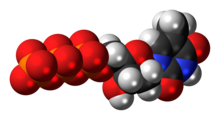Thymidine triphosphate
Appearance
(Redirected from Dttp)

| |

| |
| Names | |
|---|---|
| IUPAC name
Thymidine 5′-(tetrahydrogen triphosphate)
| |
| Systematic IUPAC name
O1-{[(2R,3S,5R)-5-(2,4-Dioxo-5-methyl-3,4-dihydropyrimidin-1(2H)-yl)-3-hydroxyoxolan-2-yl]methyl} tetrahydrogen triphosphate | |
| Other names
dTTP, 2′-Deoxythymidine triphosphate
| |
| Identifiers | |
3D model (JSmol)
|
|
| ChEBI | |
| ChEMBL | |
| ChemSpider |
|
| ECHA InfoCard | 100.006.064 |
| MeSH | thymidine+5'-triphosphate |
PubChem CID
|
|
| UNII | |
CompTox Dashboard (EPA)
|
|
| |
| Properties | |
| C10H17N2O14P3 | |
| Molar mass | 482.168 |
Except where otherwise noted, data are given for materials in their standard state (at 25 °C [77 °F], 100 kPa).
| |
Thymidine triphosphate (TTP), also called deoxythymidine triphosphate (dTTP),[1] is one of the four nucleoside triphosphates that are used in the in vivo synthesis of DNA. Unlike the other deoxyribonucleoside triphosphates, thymidine triphosphate does not always contain the "deoxy" prefix in its name.[2] This is because dTTP does not have a corresponding ribonucleoside triphosphate, as the uridine triphosphate, which lacks thymidine's 5-methylation, is used instead.
dTTP is synthesized via the methylation of dUMP via thymidylate synthase.
It can be used by DNA ligase to create overlapping "sticky ends" so that protruding ends of opened microbial plasmids may be closed up.
References
[edit]- ^ "Thymidine 5'-triphosphate (PAMDB000346)". University of Maryland, Baltimore. 2018-01-22. Archived from the original on 2023-10-29. Retrieved 2023-10-29.
- ^ Coghill, Anne M.; Garson, Lorrin R., eds. (2006). The ACS style guide: effective communication of scientific information (3rd ed.). Washington, D.C.: American Chemical Society. p. 244. ISBN 978-0-8412-3999-9.
